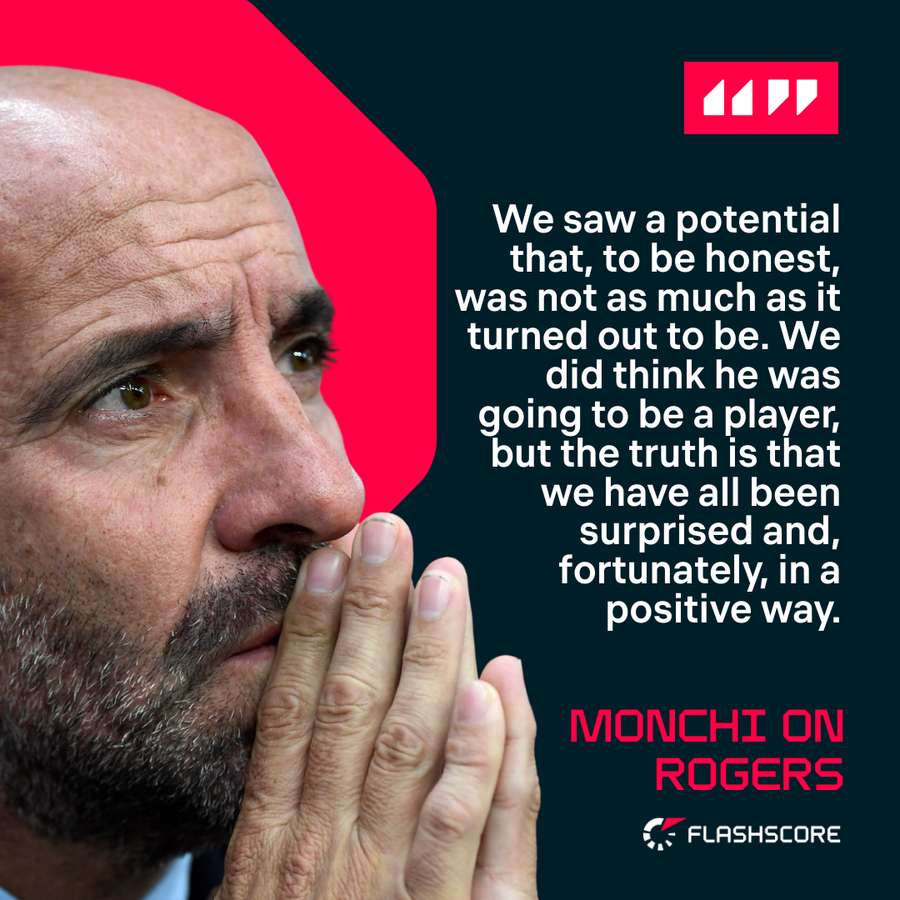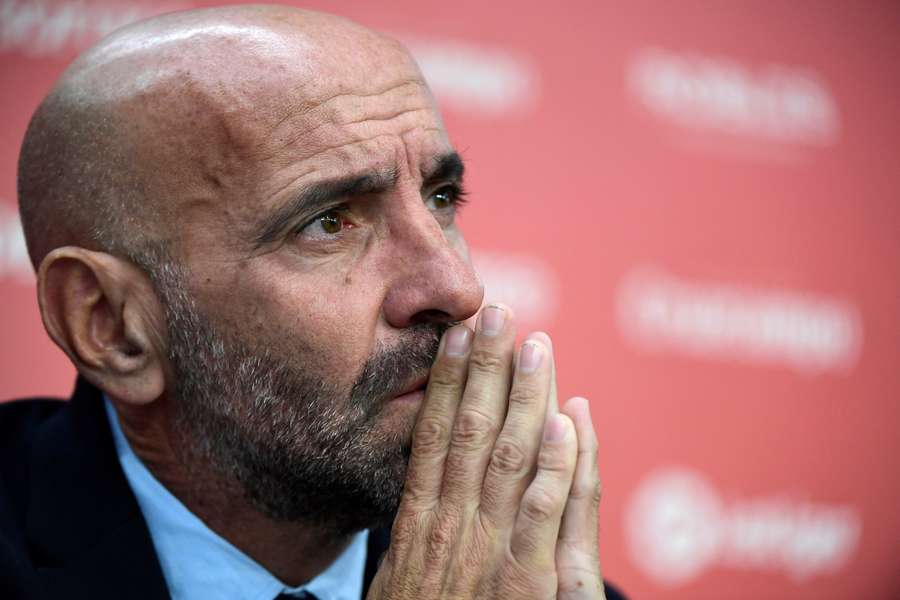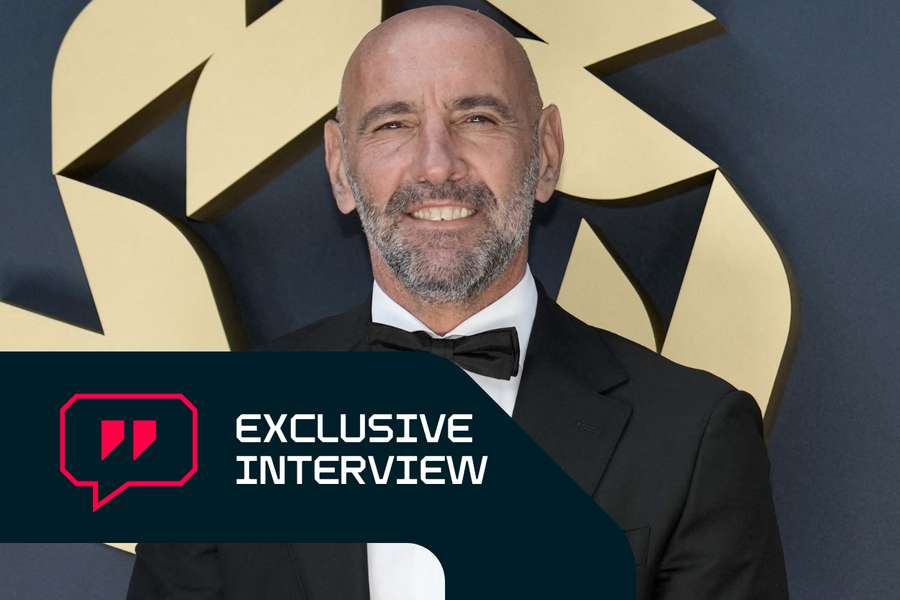In part two of our exclusive interview with him, the Spaniard reflects on stints at Roma and Aston Villa, and also opens up about a host of big-name signings in the second part of our exclusive interview. Read part one here.
Question: Monchi, what is the reason why you have left Aston Villa?
A: "There was a consensus on all sides that, after two very successful years, both sportingly and economically, the next step the club had to take was to consolidate its position in the elite. And we all thought that, after a significant attrition, new faces were possibly necessary and that I could look for new challenges. And based on consensus, education and respect, we agreed that this was the best thing for everyone."
Q: How have you personally lived in Birmingham? Because it is very different to live there than in Seville, in Andalusia.
A: "Yes, obviously there are some differences, mainly climatic, but it has been a city that has welcomed me very well and where I have enjoyed two and a half magnificent years. I imagine that it also has to do with the fact that they have been very good years on a sporting level, so the mood and everything is more positive.
"I lived in the city centre, in St. Paul's Square, very close to the centre and relatively close to Bodymore, the sports city. Obviously, I missed Spain, Seville, and especially San Fernando. But I have lived very well. It has been a city that has welcomed me very well and of which I have very fond memories."
Q: As someone who is very well known, have you felt the difference between living in Birmingham and living in Spain? I say that because of the privacy.
A: "Yes, man, living in Birmingham, with respect to the privacy that you lose when you are a public person, is a perfect place, because, as I say, in Birmingham I have been able to go out in the street practically without being recognised. As time went on, I was recognised a bit more."
Q: You've been invited for a few pints, I'm sure, there, in the bars.
A: "There is a difference, obviously, between one life and another. But as I said, I'm a fairly cosmopolitan person, I adapt well to everything, and I haven't suffered that change beyond occasional moments, trying to understand that on the 20th of August it can be 10 degrees and not 45."
A Villa where the boss is Unai Emery
Q: At Aston Villa, you worked with Unai Emery for the second time, because before that, you worked with him at Sevilla. How do you compare those two periods with him?
A: "Well, on a personal level, practically the same. We are two very demanding people, very nervous, very intense. On a professional level, the relationship was obviously a bit different, because at Sevilla, hierarchically, I was above him. In Birmingham, he was the head of the sporting department.
"And in terms of Unai's maturity, for example, I have found Unai to be much more mature on a tactical and technical level. I think that, like everyone else, Unai has evolved and is a more mature coach."
Q: And have you seen the difference between working in the Premier League and working in Spain, in LaLiga as a sporting director, for example, in the structure of a club?
A: "Well, it is different, a dramatic difference in the Aston Villa model, where the figure of the coach is at the top of the pyramid; he is the person who is in charge of the club on a sporting level. Then, of course, there is the ownership. That doesn't usually exist in Spain.
"The figure of the sporting director in England is much more in the background, which also allows you to work more calmly. You don't have as much exposure as I had in Sevilla or Rome. The relationship with the media is also more distant. I've hardly had any interviews there; it's not the day-to-day business of being called. Everything is a bit more in the background, a bit quieter, which gives you more time, less pressure.
"And then, well, the Premier League is a model that everyone, including LaLiga, should follow. That's where its success lies. So, it has been a different professional experience, but a very, very interesting one."
Q: I suppose you have been called by more media from Spain than from England.
A: "Yes, there is more contact. But as I said, I've been able to coexist with that without any kind of problem."
Q: This summer, I don't know if you can tell us, but there was a lot of talk about Ollie Watkins and the interest of Arsenal and Manchester United. Is there anything, or were they just rumours?
A: "There was real interest in Watkins from Arsenal in the January transfer window. In the summer market, there had been no formal offer.
"In almost three months of the summer, because the markets are starting earlier and earlier, there are rumours, but not only for Ollie. Also for Morgan Rogers, for Matty Cash, for Konsa, for McGinn, for everyone, because in such an extensive market, in a squad with such good players and who also come from two magnificent seasons, there are rumours, but there were no formal offers."
Q: You mentioned Morgan Rogers, a boy who was signed for little money and now his value is much higher. What have you seen in him?
A: "Well, it's been an accumulation of things. I think it's a common signing between the management and the coaching staff. We already had good reports on Morgan. We played against them in the FA Cup, and Unai saw him, both before and during the game. And, well, we thought he was a profile, apart from being a local player, apart from being young, a typical profile of a footballer who succeeds in England, who has very, very good physical conditions, but also technically.
"So, we saw a potential that, to be honest, was not as much as it turned out to be. We did think he was going to be a player, but the truth is that we have all been surprised and, fortunately, in a positive way."
Q: And the first training session he had? You thought 'maybe we made a mistake'?
A: "No, I'm very patient. I have the experience of having been a footballer and I know that there are moments when you have to be calm, because the adaptation can be faster or slower. Knowing how your coach wants you to train or work, what do you want him to put on the pitch? You have to be patient, especially if it's a player you're convinced of because you've seen him in action."

How to convince Rashford and Asensio
Q: Marcus Rashford, who you followed during your time at Aston Villa and managed to get, and who is now at Barcelona. What were the key points in convincing him?
A: "The key was Unai. Unai, when he had a conversation with Marcus, already told him: 'Look, Marcus, I'm sure about you. We are going to give you the opportunity to play in the Premier League'. He was able to transmit to him everything that Marcus needed to hear. And the best thing is that it came true, that's important. Marcus is a player with an enviable technical and physical level, a top player."
Q: Marco Asensio was the other big winter signing. I would also like to know how you convinced him and what was the key to his success at Villa. Do you put him in any of the top signings you have made?
A: "Well, Marco was a similar issue to Rashford. He was also a player that Unai has always wanted to have; in fact, before I arrived, they had been very close, before he left for Paris Saint-Germain. It's a player profile that Unai likes a lot, that number 10 who can play between the lines, who can unite the team, who has an inside pass, who has a goal. And well, between all of that, I think we convinced him.
"For me, he is a player of a very high level. I don't know where I would put him at the top, but he is one of the players with the best quality that I have been fortunate enough to have."
Q: Monchi, we all know that in the Premier League there is more money than in LaLiga. How can you compare these two competitions in terms of differences in recruitment strategies and scouting?
A: "Well, today, I think that English football has evolved in a positive way.
"One thing it has always had is economic power, because the Premiership is a championship that is followed all over the world, which generates a lot of money through different channels: sponsors, advertising, marketing, and television rights. I think that English clubs are adding the sporting structure to that. I think that in the past this was something that they lacked and it has changed today with the arrival of new investors, above all foreign investors, Americans, Asians, or in our case, even Africans.
"This has been combined with the creation of infrastructures at the level of sports management, data processing, which allow teams like Brighton, Bournemouth, and Brentford to be able to make acquisitions at a very high level."
Q: Yes, that is very difficult to do in Spain.
A: "No, in Spain there are also good structures, but perhaps that capital or that investment capacity is lacking."
Monchi's time in Rome
Q: What was missing at Roma to turn this club into your project to make it bigger?
A: "Possibly, on my part, I didn't know more about the idiosyncrasies of Roma, although sometimes when we talk about Roma and Monchi, we always see those two years as something negative. The first year, (the team) came third and played in the semi-finals of the Champions League. The second year, when I left, we were fifth, so things didn't go badly either.
"In two windows, we had to sell all the important players because of economic necessity. But yes, maybe I didn't know the idiosyncrasies a bit better. And I think that Roma lacked a bit of patience, which is something that usually happens in Rome.
"I only remember good things about Rome, because they were two magnificent years. It was my first time away from Seville and I enjoyed it a lot, especially the first year. It was a magnificent year. I insist, after having to sell Salah, Rüdiger, and Paredes, having to make very important sales, to finish third and semi-finalist in the Champions League, I think it was a magnificent success."

Q: And from the sale of Salah, what perspective are you thinking right now? Was it good or bad?
A: "It was necessary. When I arrived there, Salah was nearly sold for 33 million euros plus a three-million bonus. In the end, he was sold for 55, but there was already a commitment with the player. He wanted to leave and the only thing we could do was try to improve the price.
"You have to understand that moment, the sale of Salah was before Dembele, before the whole explosion of the football market with crazy sales. And, well, I insist, I practically had an agreement between Roma and Liverpool. What we did was to push to get as much as possible, because the player already knew he wanted to leave."
Q: You broke the record to sign Patrik Schick. What did you see in Patrik?
A: "Well, what he still does: play well and score goals. That's what strikers do, isn't it? It's true that there, well, maybe he was too young, with a lot of pressure, because he was a player with a high cost. But I still say it about Patrik, I think he is an extraordinary player and every time Leverkusen play and score goals, I see Schick. So, I don't know how many goals. I mean, he is a player who is married to scoring goals."
Q: Do you follow the players you have signed, who have a relationship?
A: "Yes, I always like to see what each of them does, because they are players that you get attached to in the end."
Q: Justin Kluivert, don't you think he arrived too soon in Rome?
A: "It's probably a similar issue to Patrick or Cengiz. Under also came very young and then time has shown...
"Look now at what he (Kluivert) is doing in the Premier League at Bournemouth, he has had a magnificent season. He is a player with a lot of quality, but maybe the weight of Rome.... That's why I said before that now I know more about the idiosyncrasies. Maybe the signing profile could have been different."
Q: But did you see those little things that you have now?
A: "Justin, a player with a punch, with a magnificent game between the lines. In the one-on-one, he is a player who is there, standing out in the Premiership in a Bournemouth team that is having a magnificent season, that has had magnificent seasons, and now he is an important player."
The ultimate test: hardest to negotiate, best signing, biggest disappointment
Q: Who has been the toughest negotiator in all this?
A: "Many. I always say Daniel Levy, possibly one of the hardest to negotiate with. Tottenham has always been a difficult club, but generally speaking, you find very capable people, with a lot of arguments, and they are complicated."
Q: The three best signings you have made? Are you going for it or not?
A: "The perfect signing is Daniel Alves. For all that it meant to discover a player practically from nothing, to adapt him, to make him perform at your club, to win titles and then sell him for a magnificent capital gain. So, I think Daniel.
"Then there are many. Morgan Rogers, to name one of the latest, but we can also talk about Fabián, Kanouté, Gameiro, Bacca, Diego Carlos. In other words, there are many to look at."
Q: Are there any stars that you almost signed, but the deal fell through?
A: "Yes, well, I think I've told you about the famous non-signing of Robin van Persie, who was a player that we had basically already signed. I was in Rotterdam, in fact, to close everything and in that impasse, a European power like Arsenal got in the way and left us with the honey on our lips. And well, unfortunately, at that time he was not very well known and the upset was great, but not much. When you look at Robin's career, the disappointment is even greater. But well, it happens, doesn't it?
"I also say that one of the signings that made me realise that Sevilla were evolving for the big time was Christian Poulsen, because he was a player that Milan were about to sign, and at the last minute we took him away from them. And that's when you realise that, hey, we're doing something right when we're able to take a player away from Milan."

